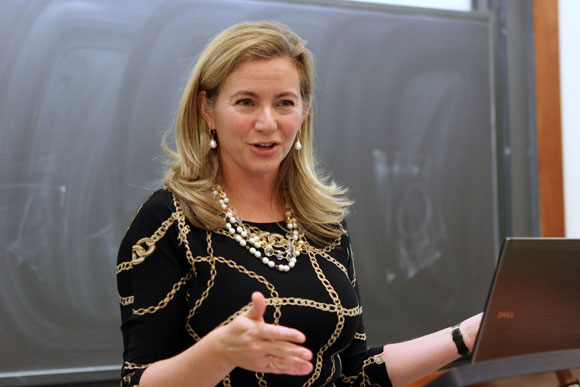News

19 July, 2016
Univ of Chicago Prof. Kalil on Raising a Successful Child
July 10th, 2016, University of Chicago Prof. Ariel Kalil of the Harris School of Public Policy chaired one of the first pre-conference sessions of the the 24th Biennial Meeting of the International Society for the Study of Behavioural Development (ISSBD) held July 10th-14th, 2016 in Vilnius. Mykolas Romeris University (MRU) Prof. Rita Žukauskienė was the ISSBD 2016 Conference Chair. She said the Meeting is the most important psychology and human behaviour development event in the world. Prof. Kalil answered questions about children's development, parenting styles and skills. 1. It is commonly believed that social inequality has a huge impact on children‘s social development and the actual inequality begins already at home. Do you agree that parental income is the main factor affecting children’s success? What other criteria can you identify? Actually, I do not agree that parental income us the main factor affecting children’s success, though it is undoubtedly important. An equally, if not more important factor, is the amount of cognitive stimulation and emotional support that parents provide to their children – the things that make parents warm, steady, and engaged parents are not necessarily the things that money can buy. 2. What kind of parenting skills, in your opinion, are the most important? How can they contribute to a better understanding of child development in families of low SES? Consistent cognitive stimulation (talking, reading); emotional support (warmth, non-punitive discipline), provision of healthy routines and habits; promoting children’s autonomy and self-reliance. 3. What are the typical intervention flaws while trying to improve social skills and parental involvement in the development of children? I think two important problems are (1) trying to change too many things at once and (2) not targeting the behaviors that parents have expressed an interest in engaging in. It is best to try to change a behaviour that a parent aspires to engage in and that a parent already believes is important. Campaigns that try to change behaviour through an “information only” approach are also generally ineffective. Many people engage in behaviors they know to be “bad” for them (ie overeating, not exercising, failing to save for retirement). 4. Most of the time we are talking about parenting styles, but you say that it is better to think about parental behavior as a set of discrete decisions and choices. What do you think needs to be done to really change the behavior of parents? I think we need to figure out ways to align parents’ aspirations with their expectations. Like most people, parents know many things that would in theory be good for them to practice with their children. And, like all people, they aspire for their children’s success. But like most people, life often gets in the way and it becomes easy to fall back on a behaviour that will satisfy immediate needs (ie turn the TV on to calm the child) vs. set aside the temptation to do this and engage in a more productive activity (ie reading to the child). 5. According to you, parents from low SES wish the best to their children, but more often they procrastinate. Why is that? How can we help to overcome these delays and move to concrete action? It is a very interesting question why low-income parents procrastinate more (or are more “present-oriented”) than their higher-income counterparts. Research has not provided a clear answer to this. But it is apparent that low-income parents suffer from more daily stressors and hassles and it is possible that these stressors interfere to a greater extent with their ability to turn their goals into actions. 6. What kind of insights from behavioral sciences can help those parents and their kids who underachieve? Our work shows that efforts to “bring the future to the present” through simple techniques such as commitment devices, reminders, feedback, and rewards for goal achievement can help close the gap between aspirations and behaviour and may help to improve the achievement of underachieving children.